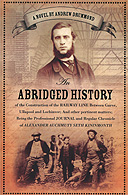
 book icon next to it.
book icon next to it.
An interview with New Books Mag is set out below, after the reviews.







The proprietor of my local small bookshop, sadly one of the last such in the city of Edinburgh, was determined to place "An Abridged History" in his tiny, but neatly-buttoned "History" section, rather than on the more lascivious, sprawling "Fiction" shelves. A brief argument ensued between the bookseller and my 'mystery shopper' (one of several friends whom I dispatched to the bookshops, as any first-time author should, for the subtle re-arrangement of shelves to ensure the prominent display of my book to the discerning public); but he was not to be dissuaded. The novel was a history, and not vice versa. And I was secretly gratified by this incontrovertible judgement, as I shall explain.
We all have a fascination with the glorious departed, both places and people. In any part of Britain, you can take a walk in the country, or in the older parts of any town or city, and stumble across the forgotten remains of abandoned railways, disused roads, vanished industry. The overgrown entrances to railway tunnels; the viaducts which span rivers and lead nowhere; the weeds which conceal foundations of vast mills; vague tracks across moorland which indicate where "the old road" ran; and the forbidding, splendid monuments which the greatly-satisfied had erected to themselves in the cemeteries, and which no one dare gainsay. It is astonishing to think that, through this tangled thicket, trains ran; where that hypermarket now stands, men, women and children laboured amidst steam and chaos; and a letter sent at two o'clock one afternoon might still be delivered before tea-time!
For late 19th Century men and women - British, American or European - almost everything seemed possible. Their heads were full of magnificent schemes: for railways, roads, bridges, flying machines, philosophies, inventions, patent medicinal cures, corsets; if there was one question, they could come up with a hundred answers. There was a profound belief in the ultimate triumph of humanity and reasoned logic over the blind forces of nature and the consequent evils of industrial society: the dawn and promise of the 20th Century! Consider these: the Forth Bridge; the National Union of Women's Suffrage Societies; the Panama Canal; the books of H.G.Wells; the Eiffel Tower; and Sherlock Holmes. Humanity had everything under control - how could anything go wrong?
When writing "An Abridged History", I had no ulterior motives, other than to give myself some mild amusement. But the novel sprouted an inordinate number of limbs, and I realised that I had an agenda: firstly, to bring back from the obscure recesses of history some sense of what went on in the forgotten corners of Scotland; secondly, to keep a small flame flickering to hint at the vast, and largely-concealed, sum of human knowledge, aspiration and endeavour; thirdly, to examine the Twentieth Century from the "wrong" end of history. I succeeded admirably ... at least in mildly amusing myself. But I hope that, in these days of "Big Brother", bite-sized learning, and the curricular abandonment of non-utilitarian subjects, even a "history" which is manifestly untrue will stir the imagination, and drive readers off to consult a dictionary and an atlas, with an eye now open for faint tracks in the landscape and the very real dreams of our forebears. It is an interesting exercise, to consider the past 100 years, not from the Present, but from 110 years ago - the wrong end of the telescope, as it were.
The hero of "An Abridged History", Alexander Auchmuty Seth Kininmonth, is a good and decent man at heart: anxious to prove his worth; convinced of the social benefits of his railway; insulted by the mis-spellings of his name; outraged by any and every injustice; frustrated by the apparent unwillingness of his navvies to perform an honest day's work; raging against the incompetence of his employers; aghast at the clouds of midge and horse-fly which come down upon him like the Plagues of Egypt. He hopes for final justice, which will afford him a grand villa in the douce spa resort of Strathpeffer, preferably to the accompaniment of the Apocalypse of the Lord sweeping away all wrong-doers - principal amongst whom are his manager and the midges. Although he suffers the great indignities of under-funded projects, the mockery of unapproachable women, sudden terminations of employment, and the loss of all his possessions when his shack blows away in a storm, he manages to pick himself up, persuade himself of another dream, and move on. Could he not be you or I?
He could have been my paternal grandfather who, in the early 1890's, made his way to America, with the dream of accumulating a vast fortune, like his compatriot Andrew Carnegie. The peak of his short American career was in selling women's underwear door-to-door; and he returned to Edinburgh, no poorer, but considerably wiser, to start a fruit-shop and a family. My grandfather - or "The Knicker-Man", as his unforgiving siblings tagged him thenceforth - had no time to be a sophisticate, but his dreams were those of millions, and do not deserve to be forgotten. There should be a democracy of historical fiction and fictional history - not just your Napoleons, your Victorias, your Brunels; but also your Kininmonths, your simple navvies, your emigrants, the skeletons in the cupboard, the Knicker-Men.
Because so much that is gone, is also lost. Not just railways and roads and factories - but, more importantly, expectations and hopes and dreams.